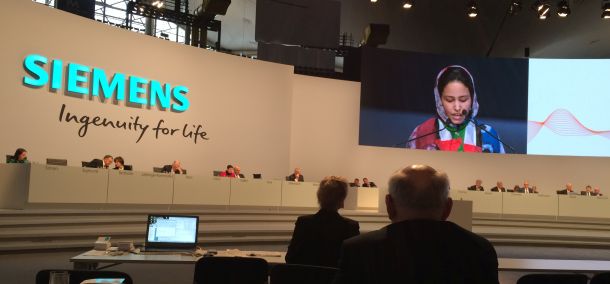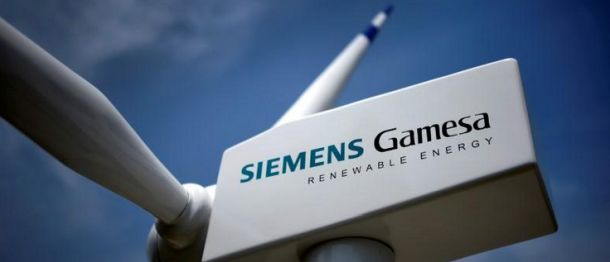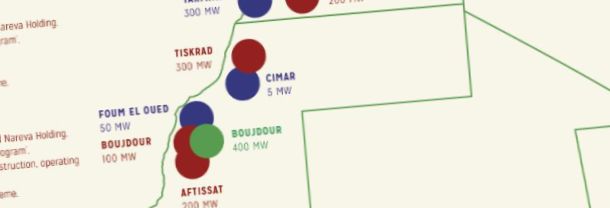
At its Annual General Meeting, Siemens Gamesa was as evasive as ever with regard to core questions about the company's involvement in occupied Western Sahara.
Above: Khalil Dambar lost his brother Said in 2010 to the gun of a Moroccan police officer. Khalil and the rest of the Saharawi people object to Siemens Gamesa's projects in occupied Western Sahara. Photo by Equipe Media.
For a decade now, different branches of Siemens – in particular Siemens Gamesa Renewable Energy (SGRE) – have been delivering, installing and servicing wind turbines in occupied Western Sahara. At its AGM on 17 March 2021, the company again avoided answering questions related to their controversial operations.
The agreements in question are in the portfolio of Nareva, the wind energy company that is owned by the king of Morocco, who bears a personal responsibility for the continued occupation of the last colony in Africa. The two operational wind farms, Foum el Oued and Aftissat, serve industrial end-users, such as Morocco’s state-owned company OCP’s subsidiary Phosboucraa, which illegally exploits the phosphate reserves of the Non-Self-Governing Territory. In September 2020, SGRE issued a press release on obtaining the contract for the 300-MW Boujdour wind farm, locating it “in the South of Morocco". Boujdour is a town located mid-coast, Western Sahara.
To date, Siemens has still to clarify whether or not it has ever obtained the explicit consent of the people of Western Sahara for its activities. Since 2016, consecutive rulings by the EU Court of Justice have ruled that Western Sahara is a “separate and distinct” territory from any country in the world, including Morocco, and that its people have a right to self-determination – as already concluded by the International Court of Justice in 1975 and repeated in well over 100 UN Resolutions. As such, the CJEU ruled, the people of Western Sahara have a right to consent in order for any commercial activity to lawfully affect their land. The same position has also been articulated by UN Treaty Bodies when reviewing Morocco’s slate under international law. Norway's largest private asset manager Storebrand has recently delisted both Siemens Energy and SGRE for contributing to violations of international law in the territory.
In over 10 years, Siemens' assessment of its involvement in Western Sahara has not evolved, despite growing criticism from civil society organisations and the people holding the sovereign rights to the land: the Saharawis. The Saharawi people have time and again voiced their opposition against Siemens’ activities in Western Sahara. Saharawi protesters stood outside of SGRE’s AGM, calling on the company to get out of their occupied homeland. A Saharawi refugee confronted SGRE with questions directly at the AGM. Days before the event, Saharawi Civil Society in Europe had run a social media campaign under the slogan #SiemensGamesaGetOut.
In collaboration with Dachverband der Kritischen Aktionärinnen und Aktionäre, Western Sahara Resource Watch (WSRW) had - again - submitted questions relating to the legal foundations of SGRE's operations in Western Sahara. Find them below. SGRE's reply - again not responding to any of the questions - is included underneath the questions.
It is of note that WSRW had raised these same questions in writing with Siemens Energy, which holds 67% of Siemens Gamesa, on 18 February 2021. Siemens Energy has on 23 March responded in a letter signed off by their legal department, that it is up to Siemens Gamesa to answer such questions “as these business activities in Western Sahara are within the scope and due responsibility of SGRE”. So far, SGRE has failed to do so, including at its most recent AGM.
QUESTIONS SUBMITTED BY WSRW AND DACHVERBAND KRITISCHEN AKTIONÄRINNEN UND AKTIONÄRE TO SGRE'S AGM OF 17 MARCH 2021
"1. In four consecutive rulings, the European Court of Justice (ECJ) has underlined that Western Sahara and Morocco are two ‘distinct and separate’ territories and that the legal prerequisite for economic activities in Western Sahara is the explicit consent of the Saharawi people.
a) Does SGRE agree with the ECJ, the UN and the International Court of Justice that Western Sahara is a Non-Self-Governing Territory, and not a region of another country?
b) On what legal basis did SGRE conclude that the Boujdour wind farm is to be located in "the South of Morocco", a view expressed in its press release in September 2020?
c) Locating Boujdour in Morocco is a tacit recognition of the Western Sahara as part of the Moroccan territory. Why does SGRE take such a position on international public law?
c) Does SGRE consider it necessary to obtain the consent of the Saharawi people for its activities in Western Sahara?
d) Does SGRE consider holding talks with Moroccan governmental institutions to be a valid means of obtaining the consent of the Saharawi people?
e) ‘SGRE engaged with Saharawi representatives present in the region’, your parent company Siemens Energy stated at its AGM on 10 February 2021. Which Saharawi representatives in the territory has SGRE engaged with? Has SGRE engaged with a single Saharawi who advocates for the Saharawi people’s right to self-determination? If yes, who? What did this person say about your operation on Saharawi land?
2. Siemens Energy stated that SGRE will ‘continue and monitor developments in the field of human rights’ in Western Sahara.
a) What sources, independent from the Moroccan government, will SGRE rely on to do so?
b) How does SGRE assess the credibility of Moroccan official institutions with regard to the situation in the territory that Morocco holds under illegal military occupation?
3. Siemens Energy referred to a legal opinion carried out by SGRE, which supposedly “reaffirmed (...) the compliance of activities in Western Sahara with applicable law”.
a) Will SGRE make this legal opinion publicly available, including sharing it with the people of Western Sahara? If not, why?
b) Can SGRE explain which legal framework is meant with “applicable law”?
c) Who wrote this external legal opinion?
3. The contract for the Boujdour wind farm was signed with the company Narvea, which is owned by the Moroccan king. In this way, SGRE ensures that the king, who is politically responsible for the occupation of Western Sahara, can personally profit from the occupation. Is this anchoring of the occupation, which is contrary to international law, ethically justifiable from your point of view?
4. In November 2020, a group of members of the European Parliament warned Siemens of "serious legal and moral risks" in doing business in Western Sahara. Why did SGRE ignore this warning and why does it continue to pursue these deals?
5. The first consequences of this decision are already becoming apparent: in January 2021, Norway's largest private asset manager, Storebrand, excluded Siemens Gamesa from its portfolio due to concerns over international law for business in the Moroccan-occupied Western Sahara. How high does SGRE assess the risk that other investing companies will follow Storebrand's example?
6. On November 18, 2020, UN-recognized representative of the Saharawi people, the Polisario Front, declared all of Western Sahara a war zone and called on all foreign companies to immediately cease doing business in the occupied territories. Will SGRE heed this call from the people of Western Sahara?
7. Following the withdrawal of Norwegian asset manager Storebrand, will you review your activities and plans in Western Sahara?
8. How do you ensure the safety of your employees who may be affected by the conflict?"
RESPONSE BY SGRE AT THE AGM, 17 MARCH 2021
"Please be aware, as a general statement that Siemens Gamesa Renewable Energy, S.A. (hereinafter “SGRE”) refrains, as a matter of policy, from taking positions or making judgements on questions of international law as well as political matters and such remains our position.
Under such premise, we are pleased to provide you with our Company ́s position on the matters you address in the Letter:
1. First of all, and starting from the last point of the Letter, please be assured that health and safety of our employees is of vital essence for SGRE. Having installed our wind turbines in more than 90 countries in the five continents, and within the framework of our strict Security and Health and Safety protocols, we continuously monitor the progress and development in all regions we operate, closely together with our customers and key stakeholders, to ensure that our employees work in safe environments.
In all the regions that we operate in, our internal security protocols include the following recurrent activities:
• Security risks are assessed and periodically updated.
• Security Incidents are monitored and assessed as part of an early alert mechanism.
• Adequate and proportional security measures are implemented according to existing risks.
• Security briefings and instructions are given to our employees.
2. We are aware that the region of Western Sahara is disputed, and that the UN considers the zone as a “non-self-governing territory” since 1963. We at SGRE have neither the mandate nor the capacity to independently advocate on such questions or to issue recognitions under international law or to affirm a territorial status. These matters fall entirely, under the responsibility of governments and institutions, that possess the adequate political capacity, and of other international organizations. We support the position of the international community and the UN, which has consistently called on the parties involved to reach a mutually acceptable political solution.
3. Related to the Ruling by the European Court of Justice, we fully support the statement made back in November 2020 by the European Union ́s High representative for Foreign Affairs and Security Policy, Mr. Josep Borrell, emphasizing its hope for a “fast-return” to UN-supervised talks, which had been suspended since March 2019, and the need for appointment of a new UN envoy for Western Sahara; the envoy position remains vacant since May 2019, after former envoy Mr. Horst Köhler, appointed August 2017, had to step down due to health reasons.
4. We fully respect the decision adopted by Storebrand -Norway's largest private asset manager-, which is relying not only in international law but also on the recommendations of the Norwegian authorities who suggest the private sector to refrain from any agreement - including investments - in Western Sahara.
5. SGRE ́s involvement in projects is limited to delivery, installation, commissioning and service of the wind turbines, being that legal duties related to project development are within the scope of responsibilities of our customers, which own and operate the wind farms according to applicable laws. In addition to this, although human rights treaties do not bind SGRE as a private Company, SGRE has made a voluntary commitment to observe fundamental human rights within the framework of the UN Global Compact.
6. Furthermore, in accordance with our commitment to the UN Guiding Principles of Business and Human Rights and the OECD Guidelines, the external legal assessment updated in February 2020 confirmed, again, the position of SGRE about the compliance of its activities in Western Sahara with applicable laws. Based on our hope for an amicable resolution of controversies, we are continuously monitoring the progress and development in the region closely together with our customers and key stakeholders.
7. In terms of the right of self-determination of people, the installation and servicing of a wind farm under SGRE ́s scope of work does not prevent local population from such right, because the project does not cut them off from access to basic services or institutions, does not destroy or erode the existing infrastructure and does not result in a depletion of natural resources. The capture and use of wind power by the equipment supplied by SGRE is not contrary to the interests of the local population.
8. On the contrary, local population shall benefit from the access to electricity by SGRE ́s contribution to green technologies, considering the vast renewables sources the region is endowed with. The region and its people have a tremendous opportunity to develop fostering investment in renewable energy, and SGRE is bringing and sharing the expertise gained globally throughout the years. SGRE follows its employment policy to hire local workforce first, whenever possible, for its projects. It is not only part time or secondary employment, it also involves both sub-contracting or else internal hiring of local workers full time. For example, during the construction of the Tarfaya wind farm (located just above the western Sahara region), 30% of Saharawi workforce was hired, and for the Aftissat wind farm construction, even 40% of total workforce employed was Saharawi. Recently, in partnership with the NGO’s High Atlas Foundation (HAF) and Santé Sud, SGRE has developed local programs focusing on water access systems, local health, and educational projects. For the access to water project, a canal, drinking towers and pumps were built to provide the main water supply for the Boujdour region ́s nomadic population, enlightened by solar panels. SGRE and HAF also conducted an environmental campaign with 17 schools located in Boujdour, focused on workshops involving 1,000 students on environmental awareness, waste management and tree planting activities. All initiatives are in respect to SDG 3 (Good health and wellbeing), SDG 4 (quality education), SDG 6 (Clean water and sanitation) and SDG 7 (Affordable and clean energy). We also supported the local communities during covid-19 times by distributing food, sanitary products as well as planting 5,000 trees in the region.
9. As it is customary within its scope of work, SGRE engages with local civil society organizations, i.e. Saharawi people representatives present in the region in this case in order to maximize the positive socio-economic outcome of the activities being carried out.
While we remain close to key global institutional stakeholders to foster a prompt amicable resolution of controversies, SGRE remain committed to the development of the region and its people, based on vast renewables resources the land is endowed with."
Siemens again refuses to answer questions about Western Sahara at AGM
For the fourth consecutive year, the German engineering company dodges questions at its Annual Shareholders Meeting as to whether it has obtained the consent of the people of Western Sahara to operate on their land.
Siemens fails to respond Western Sahara question at AGM
Why did you not seek permission from my people?, a Saharawi refugee asked at Siemens AGM. Company fails to answer questions why it operates on occupied land.
Siemens: the Moroccan king's wind turbine supplier in Western Sahara
WSRW has again asked Siemens to clarify how they’ve obtained the consent of the people of Western Sahara to their involvement in literally all of Morocco’s wind power plans in the occupied territory.
Moroccan wind energy in occupied Western Sahara passing 40%
Even more wind farms are being planned in occupied Western Sahara, and all of them are in the portfolio of the Moroccan monarch's company NAREVA.



